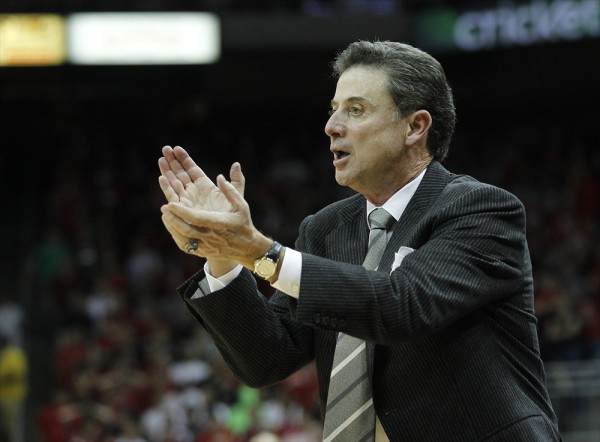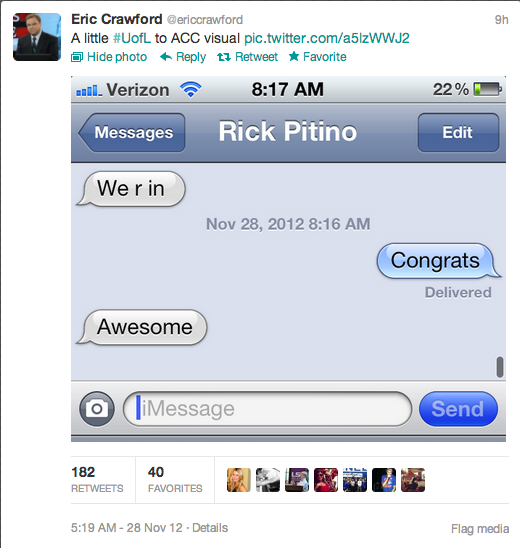Can Rick Pitino Reconcile His Change of Heart on Realignment?
Posted by Will Tucker on November 28th, 2012As has been widely reported and dissected already today, Louisville accepted an invitation to join the ACC in 2014, becoming the seventh school scheduled to depart the Big East in the past year and flanking conference peers UConn and Cincinnati in the process. Although Louisville had already been positioning itself to slide into the vacancy left by Maryland for more than a week, the formal announcement served as a wry rebuttal to yesterday’s additions of Tulane and Eastern Carolina to the Big East. Mike Aresco’s additions enter the macabre pigskin-tossing wing of a league that lacks any semblance of stability –– a ragtag assortment of Conference USA refugees and unwilling holdovers clawing towards the exits (see: Cincinnati, UConn).
For Louisville fans, the news couldn’t have come at a better time. The move triggered a rapturous outpouring from Cardinals fans on social media sites and blogs. The city seemed to breath a palpable sigh of relief, a year removed from UofL’s abortive flirtation with the Big 12 and utterly disillusioned with the league that had lifted its teams out of Conference USA less than a decade ago. The city’s mayor, local columnists, and high-profile former athletes like Darrell Griffith lent their public approval of the move. Some national media pundits applauded the ACC’s decision to invite UofL as somehow more earnest or meritocratic than the cynical motives that had won Maryland and Rutgers their golden realignment tickets. Dick Vitale called it “a slam dunk,” and noted “the Big East in in absolute chaos. It’s a great move for Louisville.”
But what of Rick Pitino? The Cardinals head coach had accepted the mantle of top Big East advocate and de facto ambassador since the league started crumbling around him; ironically, when John Swofford’s siren song first lured Pittsburgh and Syracuse to its shores last fall. The guy railed against the “corporate greed” of the ACC; he publicly aired theories of collusion designed to neuter a Big East whose basketball stature was overshadowing that of its coastal neighbor; he swore he was a “Big East guy through thick and thin,” who “wouldn’t mind dying a Big East coach.” Well a year later, he had tempered his fervor a bit, as evidenced by a text message exchange with Louisville reporter Eric Crawford early this morning:
It’s easy to paint Pitino as a duplicitous hypocrite who misled his peers in the Big East until his club got called up to the big leagues, and that’s exactly what a scathing blog post from Syracuse’s Post-Herald did today. But it’s disingenuous to crucify Pitino or anyone at Louisville for doing what every Big East football school has either already done or desperately wishes they could do: escape a languishing conference that’s lost its relevance in the national power structure and consciousness. What was a bleak outlook for the Big East a year ago has since metastasized into an untenable prospect for schools like Cincinnati, Louisville and USF that have placed an emphasis on growing upper-echelon football programs.
There’s no reason to question Pitino’s sincerity when he said he’d happily die as a Big East coach: The guy’s roots are more deeply entrenched in the league’s tradition than almost any of his contemporaries. It isn’t his decision to leave, and truthfully, there was no decision to make when Athletic Director Tom Jurich was presented with any alternative conference membership. Since delivering those examples of fiery hyperbole last year, in which Pitino went to bat for the Big East when Pitt and Syracuse’s defections shook its core, and openly demurred from the idea of joining the Big 12, the college football landscape has trended irrevocably toward an exclusionary, zero-sum super-conference structure. Pitino surely sees the writing on the wall now.
Louisville’s exit doesn’t represent exceptional disloyalty, disingenuousness or hypocrisy. Rather, it’s yet another demonstration that unwavering commitment to anything bigger than one’s own institution has become a suicidal position in the increasingly cut-throat milieu of college revenue sports. UofL’s leadership is acutely aware of that after its experience with the Big 12: School president James Ramsey stressed today that his top priority is “what’s best for the university.” It’s a tune that will reverberate among the remaining Big East members, at the expense of stability and mutual trust.













































